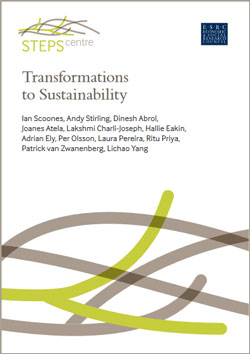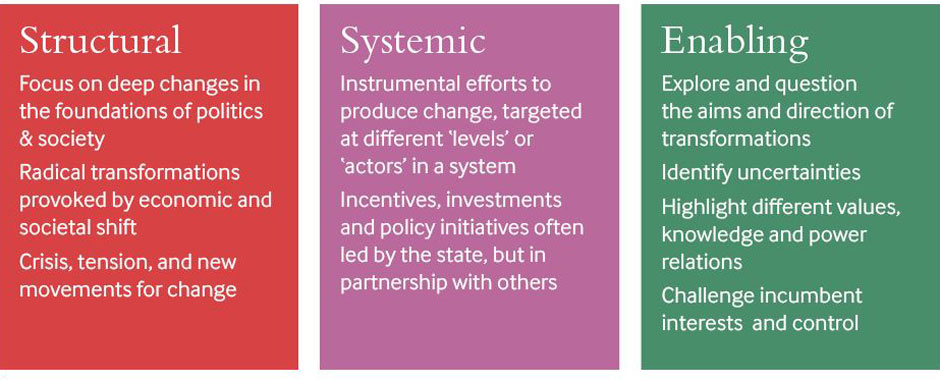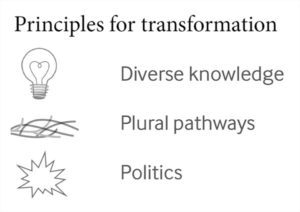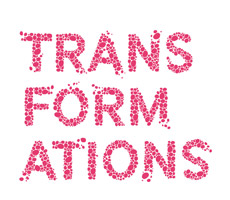A new paper from the STEPS Centre sets out a new threefold framework for achieving transformative change under the Sustainable Development Goals. The working paper, Transformations to Sustainability, is co-authored by researchers from across the STEPS global consortium.
The framework includes three approaches to transformation, which the authors call structural, systemic and enabling approaches.
 Transformations to Sustainability
Transformations to Sustainability
by Ian Scoones, Andy Stirling, Dinesh Abrol, Joanes Atela, Lakshmi Charli-Joseph, Hallie Eakin, Adrian Ely, Per Olsson, Laura Pereira, Ritu Priya, Patrick van Zwanenberg and Lichao Yang
STEPS Working Paper 104
September 2018
Three approaches to transformation
With 17 goals and 169 targets, the SDGs are the biggest collective attempt ever to address an interlinked set of global challenges over a 15-year time frame. As such, they require action on many fronts from a very broad and diverse set of actors.
The framework in the new STEPS paper provides a new way to understand what kinds of transformations are possible, in diverse areas from low carbon energy, food systems and pollution, to urbanisation and clean water provision.
- Structural approaches: these focus on deep changes in the foundations of politics, economy and society. Radical transformations can happen at key moments where the relationships between economies and societies shift, causing crisis and tension, but also new movements for change. But structural approaches can overlook the importance of local activity, cultural practices or incremental policy action.
- Systemic approaches: these focus on particular features of ‘systems’, like ‘levels’ or ‘actors’, as targets for focused instrumental change. These approaches maintain a commitment to policy change through incentives, investments and policy initiatives, usually led by the state but in alliance with others.
- Enabling approaches: these approaches highlight the agency and uncertainties inherent in choosing the aims and direction of transformation. Enabling approaches aim to reveal the different values, knowledge and relationships (including power relations) involved in change. They emphasise political mobilisation and emancipation, and aim to challenge incumbent interests and control.

In the paper, the authors show how these approaches can shed different kinds of light on major sustainability challenges.
For example, changing to low-carbon energy systems can be seen as a structural transformation. This highlights the need to reconfigure global markets and infrastructures, and the opportunities for change as the cost of renewable energy has fallen. But a systemic, socio-technical approach to energy systems highlights the innovations that emerge, like wind and solar power, and the conditions for these to spread more widely. An enabling approach highlights the contributions of civil society and grassroots movements to low carbon energy. These can contribute progress in areas like community-owned wind power, and there is a greater focus on deliberation and debate about the politics and values that shape action.
Used together, these three approaches have important implications for the way that change under the Sustainable Development Goals is supported or enabled. To flourish, the authors argue, these kinds of change require “open, plural, democratic politics, with central roles not just for policy, but also for mobilisation, critique and political challenge”.
Three principles for transformation
The authors outline three principles to guide methods and decisions about which pathways to pursue:
- Diverse knowledge: different perspectives, worldviews and experiences are vital for understanding problems and potential solutions. Hybrid knowledge systems – combining diverse sources of knowledge – can emerge through productive interactions in which research priorities, problem definitions and options are negotiated.
- Plural pathways: Different ideas and values about sustainability have very different implications for how institutions and infrastructures, from regulation to roads, should be transformed. No matter how specific the context, there is never only one relevant, viable path.
- Politics: Negotiations among contending knowledges and divergent interests across multiple actors inevitably involves politics: confronting disparate views, interests and forms of power.
 To make these principles work in practice, a variety of methods and processes can help. In diverse areas from agriculture to energy to health, approaches like multi-criteria mapping and participatory scenario workshops can help to explore the implications of different pathways. The authors also point to Transformation Labs (T-Labs) as a promising way to explore different knowledge, pathways and politics in particular settings.
To make these principles work in practice, a variety of methods and processes can help. In diverse areas from agriculture to energy to health, approaches like multi-criteria mapping and participatory scenario workshops can help to explore the implications of different pathways. The authors also point to Transformation Labs (T-Labs) as a promising way to explore different knowledge, pathways and politics in particular settings.
In depth: T-Labs
‘Transformation Labs’ (T-Labs) – facilitated processes including research and interactive workshops – have been used to appreciate diverse knowledge, plural pathways and politics to address specific problems where society and ecology are changing together. T-Labs combine a variety of methods for revealing different perspectives and options, according to the needs in each place.
For example, a T-Lab in Xochimilco, Mexico City, has explored the dilemmas facing a place of great ecological and social significance under severe pressure. The wetland of Xochimilco, with its canals and traditional farming systems, has undergone rapid changes in land use and environmental degradation. Farmers, tourists and urban residents all compete for the wetland in different ways, and attach different values to it. The axolotl, a rare amphibian whose only natural habitat is in Lake Xochimilco, has become an icon for the local ecosystem. The canals with their colourful boats are a haven for tourists. And chinampas, farms using methods descended from the pre-colonial era, are an important source of livelihoods. Many efforts to protect the wetland, despite the inputs of scientific expertise and work from city authorities, have failed.
The Transformation Lab explored how technology, lifestyles and planning rules could be transformed. But it also created a space to explore the values and meanings that different groups attach to Xochimilco, and understand people’s agency to create change. The T-Lab investigated where power is held and how it can be mobilised. For some local people, this partly means putting up resistance to development plans and elite control. But a change in political leadership is also expected, and Mexico City has embraced planning for resilience, which could provide a chance for transformation to occur.
LINKS
Transformations to Sustainability: STEPS Working Paper 104
Our theme for 2018: Transformations
 Faced with a series of social and environmental stresses and shocks, there are urgent calls for radical, systemic change. But, as past and present experience show, this can take many forms. What does it take to make sustainability transformations emancipatory (caring), rather than repressive (controlling)?
Faced with a series of social and environmental stresses and shocks, there are urgent calls for radical, systemic change. But, as past and present experience show, this can take many forms. What does it take to make sustainability transformations emancipatory (caring), rather than repressive (controlling)?
Find out more about our theme for 2018 on our Transformations theme page.